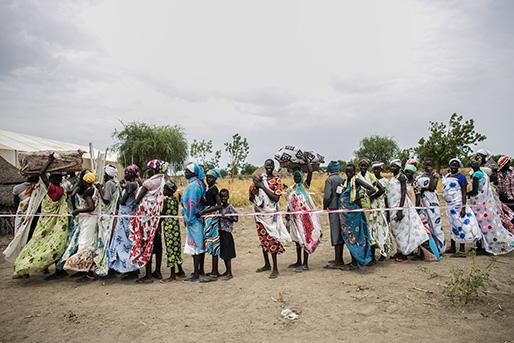EU humanitarian aid also targets IDPs in Syria, Nigeria, South Sudan, Iraq, Ethiopia, and Yemen, among others.
In April 2016, the European Commission adopted the Communication ‘Lives in Dignity: from Aid-dependence to Self-reliance. Forced Displacement and Development’, which presented a development-led approach to forced displacement.
The objective is to strengthen the resilience and self-reliance of both the displaced and their host communities, working with host governments and local actors to support the gradual socio-economic inclusion of refugees and IDPs.
The approach aims to harness the productive capacities of refugees and IDPs by helping them access education, health care, housing, land, livelihood support, legal protection, and other basic services.
The EU also funds partners (including the Norwegian Refugee Council and the Danish Refugee Council) to support people in mixed migration settings such as in Tunisia, Egypt, and Libya. These partners help strengthen community protection networks (composed of IDPs and representatives from host communities) and local legal providers.
Partnerships and policy
The Commission channels its financial support into addressing forced displacement situations through organisations dealing with refugees, IDPs, migrants and host communities on the ground. Its main humanitarian partners include the UN Refugee Agency (UNHCR), the International Organization for Migration (IOM), the Red Cross and Red Crescent movement, and non-governmental organisations.
To ensure more predictable and equitable responsibility-sharing among states, the EU supports the implementation of the Global Compact on Refugees. Adopted in 2018, the Global Compact builds on the Comprehensive Refugee Response Framework (CRRF), which was rolled out in several countries in 2017 and 2018 for greater support to refugees and host countries. The EU took part in the 2023 Global Refugee Forum, during which it announced 15 ambitious and forward-looking pledges.
The EU strongly supports the Guiding Principles on Internal Displacement, and systematically promotes the inclusion of these principles in international and national law. In addition, the EU supported the work of the United Nations Secretary-General’s (UNSG) High Level Panel on Internal Displacement, which submitted its recommendations in September 2021, and resulted in the launch in June 2022 of the UNSG Action Agenda on Internal Displacement.
From July 2022 to December 2023, the EU held the Presidency of the Platform on Disaster Displacement, a state-led initiative working towards better protection for people displaced as a result of disasters and climate change.
Last updated: 18/01/2024



